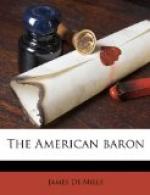“I’m charmed to hear you say so.”
“It’s true, ma’am; but let me add, ma’am, that the ruins of this ancient city do not offer to my eyes a spectacle half so melancholy as the great moral ruin which is presented by the modern city. For, ma’am, when I look around, what do I see? I behold the Babylon of the Apocalypse! Pray, ma’am, have you ever reflected much on that?”
“Not to any great extent,” said Lady Dalrymple, who now began to feel bored, and so arose to her feet. The Reverend Saul Tozer was just getting on a full head of conversational steam, and was just fairly under way, when this sad and chilling occurrence took place. She rose and bowed to the gentlemen, and began to retreat.
All this time the Baron had been pouring forth to Mrs. Willoughby his excited interrogatories about Minnie’s health, and had asked her to take a message. This Mrs. Willoughby refused at first.
“Oh no!” said she; “it will really disturb her too much. What she wants most is perfect quiet. Her health is really very delicate, and I am excessively anxious about her.”
“But does she—does she—is she—can she walk about her own room?” stammered the Baron.
“A little,” said Mrs. Willoughby. “Oh, I hope in a few weeks she may be able to come down. But the very greatest care and quiet are needed, for she is in such a very delicate state that we watch her night and day.”
“A few weeks!” echoed the Baron, in dismay. “Watch her night and day!”
“Oh, you know, it is the only chance for her recovery. She is so delicate.”
The Baron looked at Mrs. Willoughby with a pale face, upon which there was real suffering and real misery.
“Can’t I do something?” he gasped. “Won’t you take a message to her? It ought to do her good. Perhaps she thinks I’m neglecting her. Perhaps she thinks I ain’t here enough. Tell her I’m ready to give up my office, and even my title of nobility, and come and live here, if it’ll be any comfort to her.”
“Oh, really, Sir, you quite mistake her,” said Mrs. Willoughby. “It has no reference to you whatever. It’s a nervous affection, accompanied with general debility and neuralgia.”
“Oh no, you don’t know her,” said the Baron, incredulously. “I know her. I know what it is. But she walks, don’t she?”
“Yes, a little—just across the room; still, even that is too much. She is very, very weak, and must be quite kept free from excitement. Even the excitement of your visits is bad for her. Her pulse is—is—always—accelerated—and—she—I—Oh, dear me!”
While Mrs. Willoughby had been making up this last sentence she was startled by a rustling on the stairs. It was the rustle of a female’s dress. An awful thought occurred to her, which distracted her, and confused her in the middle of her sentence, and made her scarce able to articulate her words. And as she spoke them the rustle drew nearer, and she heard the sound of feet descending the stairs, until at last the footsteps approached the door, and Mrs. Willoughby, to her utter horror, saw Minnie herself.




